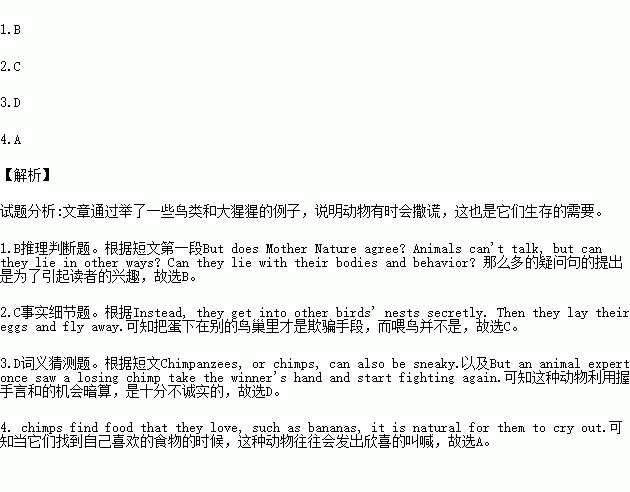题目内容
Most people agree that honesty is a good thing. But does Mother Nature agree? Animals can't talk, but can they lie in other ways? Can they lie with their bodies and behavior? Animal experts may not call it lying, but they do agree that many animals, from birds to chimpanzees, behave dishonestly to fool other animals. Why? Dishonesty often helps them survive.
Many kinds of birds are very successful at fooling other animals. For example, a bird called the plover sometimes pretends to be hurt in order to protect its young. When a predator(猎食动物)gets close to its nest, the plover leads the predator away from the nest. How? It pretends to have a broken wing. The predator follows the "hurt" adult, leaving the baby birds safe in the nest.
Another kind of bird, the scrub jay, buries its food so it always has something to eat. Scrub jays are also thieves. They watch where others bury their food and steal it. But clever scrub jays seem to know when a thief is watching them. So they go back later, unbury the food, and bury it again somewhere else.
Birds called cuckoos have found a way to have babies without doing much work. How? They don't make nests. Instead, they get into other birds' nests secretly. Then they lay their eggs and fly away. When the baby birds come out, their adoptive parents feed them.
Chimpanzees, or chimps, can also be sneaky. After a fight, the losing chimp will give its hand to the other. When the winning chimp puts out its hand, too, the chimps are friendly again. But an animal expert once saw a losing chimp take the winner's hand and start fighting again.
Chimps are sneaky in other ways, too. When chimps find food that they love, such as bananas, it is natural for them to cry out. Then other chimps come running. But some clever chimps learn to cry very softly when they find food. That way, other chimps don't hear them, and they don't need to share their food.
As is mentioned above, animals behave dishonestly for survival. Is it OK to lie for us human?
1.The writer uses the three questions at the beginning of the passage to _________.
A. ask the readers to answer the questions
B. draw the readers’ attention to the topic
C. seek answers to the questions
D. show he is at a loss about the question.
2.Which of the following is not an example of animal’s dishonest behaviors?
A. A plover pretended to have a broken wing to protect its baby birds.
B. A scrub jay dug out its buried food and reburied it somewhere else.
C. The adoptive parents feed their baby birds of cuckoos.
D. A losing chimp starts fighting again after taking the winner’s hand.
3.The underlined word “sneaky” in paragraph 5 most probably means______.
A. selfish B. friendly
C. entertaining D. dishonest
4.What is the common reaction of most chimps when they find their favorite food?
A. They let out a loud cry
B. They cry in a very low voice
C. They hide their food immediately
D. They share their food with other chimps.

